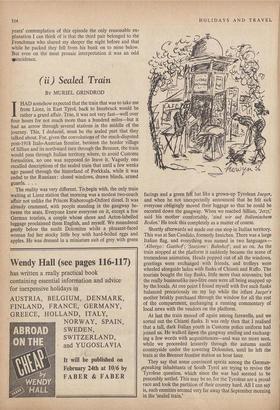( ii) Sealed Train
BY MURIEL GRINDROD IHAD somehow expected that the train that was to take me from Lienz, in East Tyrol, back to Innsbruck would be rather a grand affair. True, it was not very fast—well over four hours for not much more than a hundred miles—but it had an arrow through several stations in the middle of the journey. This, I deduced, must be the sealed part that they talked about. For, given the convolutions of the much-disputed post-1918 Italo-Austrian frontier, between the border village of Sillian and its northward turn through the Brenner, the train would pass through Italian territory where, to avoid Customs formalities, no one was supposed to leave it. Vaguely one recalled descriptions of the sealed train that until a few weeks ago passed through the hinterland of Porkkala, while it was ceded to the Russians : closed windows, drawn blinds, armed guards. . . .
The reality was very different. To begin with, the only train waiting at Lienz station that morning was a modest two-coach affair not unlike the Princes Risborough-Oxford diesel. It was already crammed, with people standing in the gangway be- tween the seats. Everyone knew everyone on it, except a few German tourists, a couple whose shoes and Acton-labelled luggage proclaimed them English, and myself. We meandered gently below the sunlit Dolomites while a pleasant-faced woman fed her stocky little boy with hard-boiled eggs and apples. He was dressed in a miniature suit of grey with green facings and a green felt hat like a grown-up Tyrolean Jaeger, and when he not unexpectedly announced that he felt sick everyone obligingly moved their luggage so that he could be escorted down the gangway. When we reached Sillian, 'Jetzt,' said his mother comfortably, 'find wir auf italienischem Boden.' He took this completely as a matter of course.
Shortly afterwards we made our one stop in Italian territory. This was at San Candido, formerly Innichen. There was a large Italian flag, and everything was named in two languages- Albergo: Gasthof'; 'Stazione: Bahnhof'; and so on. As the train stopped at the platform it suddenly became the scene of tremendous animation. Heads popped out of all the windows, greetings were exchanged with friends, and trolleys were wheeled alongside laden with flasks of Chianti and Ruffo. The tourists bought the tiny flasks, little more than souvenirs; but the really businesslike two-litre ones were all being snapped up by the locals. At one point 1 found myself with five such flasks balanced precariously on my lap while the infant Jaeger's mother briskly purchased through the window for all the rest of the compartment, exchanging a running commentary of local news with the vendors on the platform.
At last the train moved off again among farewells, and we sorted out the Chianti flasks. It was only then that I realised that a tall, dark Italian youth in Customs police uniform had joined us. He walked down the gangway smiling and exchang- ing a few words with acquaintances—and was no more seen, while we proceeded leisurely through the autumn sunlit countryside under the towering Dolomites, until he left the train at the Brenner frontier station an hour later.
They say that some convinced spirits among the German- ospeaking inhabitants of South Tyrol are trying to revive the Tyrolese question, which since the war had seemed to be peaceably settled. This may be so, for the Tyrolese are a proud race and took the partition of their country hard. All I can say is, such enmities seemed very far away that September morning in the 'sealed train.'










































 Previous page
Previous page